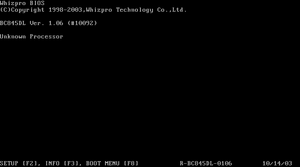No edit summary |
No edit summary |
||
| Line 1: | Line 1: | ||
[[File:Whizpro BIOS.png|thumb|POST screen on the BCM BC845DL motherboard]] | [[File:Whizpro BIOS.png|thumb|POST screen on the BCM BC845DL motherboard]] | ||
'''Whizpro BIOS''', also known as '''WhizBIOS''', is a | '''Whizpro BIOS''', also known as '''WhizBIOS''', is a [[BIOS|personal computer BIOS]] developed by Whizpro Technology from the late-90s to the mid-2000s. It is mostly used on industrial or embedded systems, especially the ones made by BCM Advanced Research and Iwill. Its earliest known instance is from 1999, while the last known is from circa 2004-2005. | ||
The last known trace of Whizpro Technology is from a February 2005 version of WFLASH, a BIOS flashing tool for Whizpro BIOS ROMs.<ref>https://forums.mydigitallife.net/threads/bios-tools.529/page-13</ref>. | The last known trace of Whizpro Technology is from a February 2005 version of WFLASH, a BIOS flashing tool for Whizpro BIOS ROMs.<ref>https://forums.mydigitallife.net/threads/bios-tools.529/page-13</ref>. | ||
| Line 54: | Line 54: | ||
=== Later versions === | === Later versions === | ||
Despite no more updates being made | Despite no more updates being made on the website, Whizpro BIOS' development apparently continued for a while. Sometime around 2004-2005, support for Intel's 915G chipset (and likely also other 915x series of chipsets) was implemented, as seen on the BCM IN915GV and IN915GVR motherboards. Although no ROMs are available for either of these motherboards, their specifications mentioned Whizpro BIOS before they were removed from the BCM website. These motherboards run not only the last known instances of Whizpro BIOS, but also the only known instances for a PCIe based platform. | ||
Revision as of 08:19, 5 June 2025

Whizpro BIOS, also known as WhizBIOS, is a personal computer BIOS developed by Whizpro Technology from the late-90s to the mid-2000s. It is mostly used on industrial or embedded systems, especially the ones made by BCM Advanced Research and Iwill. Its earliest known instance is from 1999, while the last known is from circa 2004-2005.
The last known trace of Whizpro Technology is from a February 2005 version of WFLASH, a BIOS flashing tool for Whizpro BIOS ROMs.[1].
Known versions
COMDEX Fall '99 Demo release
According to the "News" section of the defunct whizpro.com website, a "demo BIOS product" was showcased by Whizpro Technologies at COMDEX Fall '99 in Las Vegas in November 1999.[2] Although this "BIOS product" was likely Whizpro BIOS, it's unknown whether a pre-release or finalized version was demoed.
2000 release
Based on information from the same website, Whizpro BIOS was (supposedly) already available for desktop and embedded PCs in 2000.
The following platforms were supported by the desktop version:
- Intel 810, 810E and 815E chipsets
- VIA Apollo Pro Plus, Pro 133 and Pro 133A chipsets (with VT82C596B southbridge only)
- VIA KX133 and KT133 chipsets
Meanwhile, the embedded version supported the following platforms:
- Intel 430TX, 440BX and 440ZX chipsets
- National Semiconductor Geode GXLC, SC1400 and 5530 series of processors
- STMicroelectronics STPC chipsets (exact models unknown, although likely all models released by that point)
Support for DDR memory based VIA chipsets and Intel's "Timna" processor was also announced, neither of which were released at the time. Although, as the "Timna" processor was later cancelled, it was likely never supported later on.
January 2002 release
According to the newer whizpro.com.tw website, the desktop version also supported the following platforms by January 2002:[3]
- Intel 845 (original) northbridge
- National Semiconductor Geode GX1 and GXM processors
- Transmeta Crusoe TM3xxx and TM5xxx processors
- VIA KT133A and KM133 northbridges
- VIA P4X266 and P4M266 northbridges
- VIA PM133 northbridge
- VIA PRO266 and KT266 northbridges
- VIA "VT82C593A" (likely a typo of VT82C596A), VT82C686A and VT82C686B southbridges
May 2002 release
According to the same website, Whizpro BIOS also supported various ALi, AMD and SiS chipsets by May 2002, although exact models of these supported chipsets are unknown.
The website also claimed support for any x86 architecture based processor.
June 2003 release
The following platforms were already supported by June 2003:
- Intel 845D, 845G, 845GL, 845E, 845GE, 845PE, 845GV and 875P northbridges
- VIA CLE266 northbridge
- VIA KT266A, KM266, KT333, KT400 and KM400 northbridges
- VIA P4X266A, P4X333 and P4M333 northbridges
- VIA PLE133, PLE133A, PLE133T and PM133 northbridges
November 2003 release
Supposedly, VIA's K8T800 and K8M800 northbridges were already supported by November 2003. This was also the last time the website was updated.
Later versions
Despite no more updates being made on the website, Whizpro BIOS' development apparently continued for a while. Sometime around 2004-2005, support for Intel's 915G chipset (and likely also other 915x series of chipsets) was implemented, as seen on the BCM IN915GV and IN915GVR motherboards. Although no ROMs are available for either of these motherboards, their specifications mentioned Whizpro BIOS before they were removed from the BCM website. These motherboards run not only the last known instances of Whizpro BIOS, but also the only known instances for a PCIe based platform.